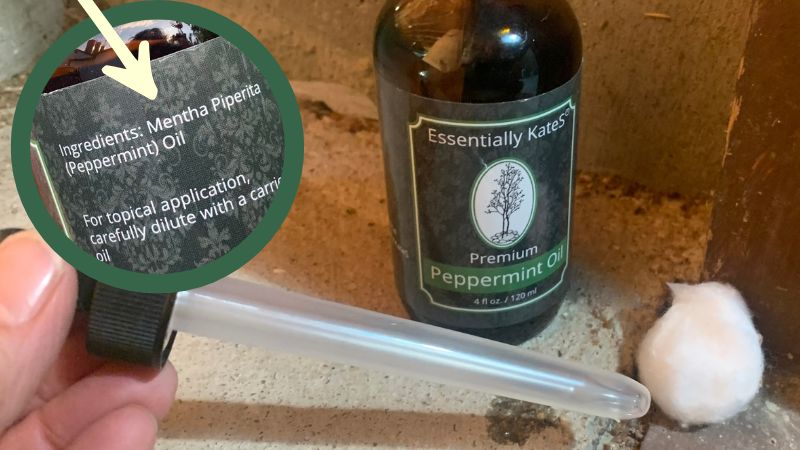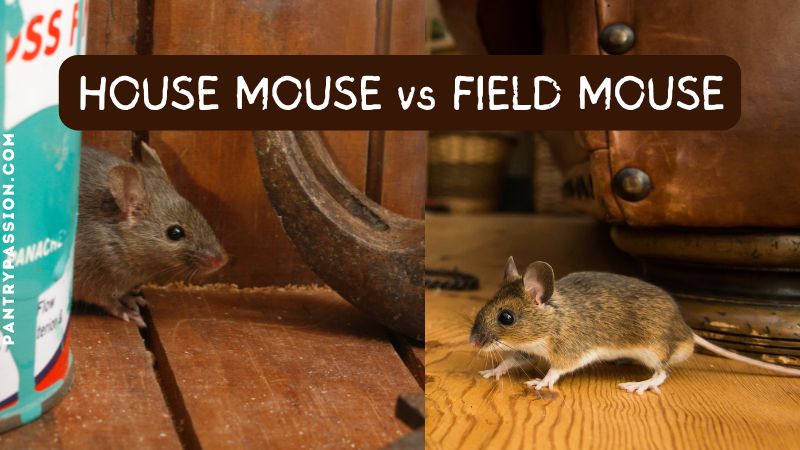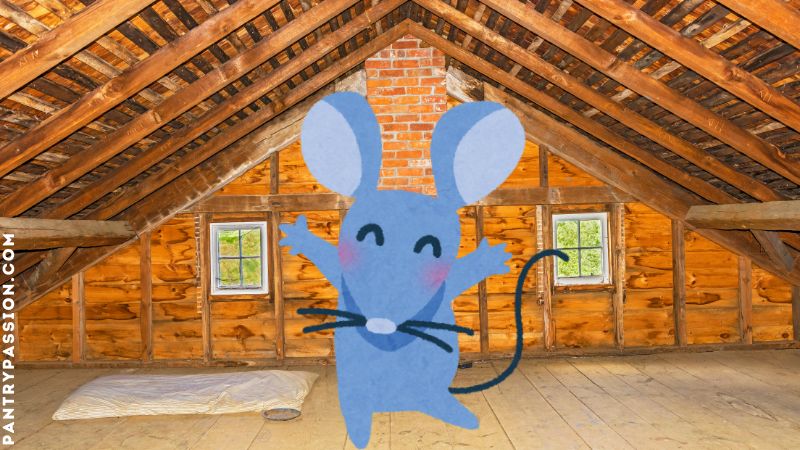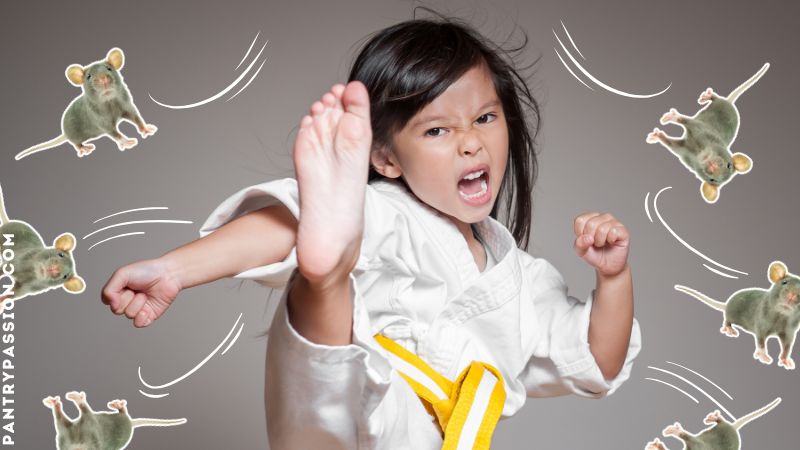The Best Fluffy Pancakes recipe you will fall in love with. Full of tips and tricks to help you make the best pancakes.

After months of research on rodent control, and reading personal accounts, one thing was clear: peppermint oil works. It works so well that I decided it needed its own blog post!
Check out my charts on peppermint oil’s effects on insects and other wildlife. Peppermint oil is a nothing short of a miracle product when it comes to keeping pests out of your house, outside property, and vehicles.
Get ready for some great tips on how to use peppermint oil to deter mice and other pests, when it doesn’t work, and how to read the label to make sure you are buying the right stuff.
DON’T MISS Pantry Passion’s Complete Article List for Mouse & Rat Prevention!
Table of Contents
- Does Peppermint Oil Deter Mice?
- Can Peppermint Oil Kill Mice… How About Rats?
- Don’t Use the Wrong Peppermint!
- DIY Peppermint Oil Spray for Mice
- How Long Does Peppermint Smell Last?
- Evaluating Commercial Peppermint Oil Mouse/Pest Spray
- Where to Spray Peppermint Oil
- 🌿 Other Forms of Peppermint – Do They Work?
- Is Peppermint Oil Safe for Dogs and Cats?
- 🌿 Peppermint Oil: Repel vs. Attract Chart (Wildlife & Pets)
- 🌿 Peppermint Oil: Repel vs. Attract Insects Chart
- 🌿 Mint vs. Spearmint vs. Peppermint
- Peppermint Oil FAQ
Does Peppermint Oil Deter Mice?
Absolutely! Peppermint oil is the #1 natural ingredient recommended to repel mice. It also equally repels rats. There are so many ways to use it. Pure peppermint oil will have the most repelling power, but it isn’t always needed at full force.
Peppermint oil’s super powers:
- Repels: The strong menthol scent overwhelms rodents’ sensitive noses, making treated areas unpleasant for nesting or foraging.
- Disrupts behavior: It can interfere with their ability to track food sources or navigate familiar paths.
- Discourages entry: When applied consistently, it may prevent mice and rats from entering or returning to specific areas.
As wonderful as peppermint oil is, it won’t eliminate infestations: If rodents are already nesting or have access to food, they may tolerate the scent or find ways around it.
According to Mouse Trap Genius, “If you’ve recently gotten rid of mice, this is a perfect product [peppermint oil] to keep them out.” They’re very honest in the fact that peppermint oil is not the first wave of defense – trapping is.
Best advice: use peppermint oil in combination with mouse traps, and of course seal entry points for optimum results!
Can Peppermint Oil Kill Mice… How About Rats?
No, peppermint oil does not kill mice or rats. It’s a natural repellent, not a poison or lethal agent. Peppermint oil lacks any toxic properties that would be fatal to mice or rats.
Don’t Use the Wrong Peppermint!
Successful use of peppermint oil as a deterrent to mice and other pests all hinges on the right choice of peppermint products:
DIFFERENCES BETWEEN TYPES OF PEPPERMINT OIL:
There are two types of “peppermint” oil sold…both come from the plant Genus Mentha. These two are Mentha piperita and Mentha arvensis (Corn Mint). The one you want is Mentha piperta. It costs about twice what Mentha arvensis costs, but it is the one recommended for use as a rodent repellant. If a product doesn’t clearly state which oil it is, you can assume it is the less effective/cheaper oil….and it usually has some bad reviews. -Source @carlwelte6094
PEPPERMINT OIL vs PEPPERMINT EXTRACT
There’s a significant difference between the two. Peppermint oil is a highly concentrated essential oil, while peppermint extract is a diluted form of the oil, typically in an alcohol or glycerin base. Consequently, peppermint oil is far more potent, requiring much smaller quantities than extract for flavoring, and has broader uses including aromatherapy, whereas extract is primarily used in baking and food flavoring.
Note: Most people like the smell of peppermint. However, the fragrance may not be preferred in a kitchen and pantry environment. Instead, try cinnamon oil spray or cloves, each effective natural mouse deterrents.
DIY Peppermint Oil Spray for Mice
If you’re looking for a homemade peppermint spray remedy for mice, I have you covered. These same recipes are mentioned in my Homemade Rat Spray for Car Engines or ANY Engines. I also heavily recommend peppermint and other natural deterrents on this same page to keep mice out of all kinds of vehicles, campers, and farm equipment.
Reduce water amounts is you prefer a higher potency of peppermint fragrance:
RECIPE 1: Mix and pour into small squirt bottle: water, 1 tablespoon of peppermint oil and a couple of drops of dishwasher liquid soap or rubbing alcohol (1 teaspoon of alcohol). Dawn dish/rubbing alcohol help the peppermint oil remain mixed with the water. Spray in engine compartments to combat wire-nibbling rodents (great for non-food areas of your grill, too – smells great to humans, not for mice). To get the oil to mix more easily, create an emulsion with a little bit of peppermint castile soap in warm water with the peppermint oil and shake it up.

RECIPE 2: Use 2 tablespoons of concentrated peppermint or spearmint oil per gallon of water and use as a spray.
RECIPE 3: Use 15-20 drops pure peppermint oil to 1 quart of water.
RECIPE 4: Fill a spray bottle of half white vinegar and half water then add about a teaspoon of peppermint oil and shake well. Good for engine compartments. Respray about every four months (I haven’t tested this, but it seems mixing the peppermint oil with another carrier extends the length of time the odor lasts).
Although peppermint oil can be mixed with water, consider mixing it with 70% alcohol. This applies to any kind of essential oil. The alcohol disinfects and evaporates faster. Users report that the alcohol seems to carry the mint oil better, making the scent dissipation spread fast.
Note: Peppermint spray can stain, such as decking and fabrics.
Applying Peppermint Oil on Cotton Balls
Cotton balls are also a go-to choice for soaking up peppermint oil. One mouse-fearing user advises to “use a BOWL of cotton balls, not just one!” TIP: leave the mice a route out, because they won’t go anywhere near peppermint-soaked cotton balls. After a few days to a week, place the oil soaked cotton ball in the space you left for their exit SO THEY NEVER COME BACK!
Warning: Mice love cotton for building their nests. If the peppermint odor fades away, they might must steal the cotton ball for nest material! Be sure to pick up and discard any unused cotton balls.
The Peppermint “Chase-Out” Method
Use peppermint to chase out mice from homes and vehicles:
If it’s your home, start with one room first, and each day do the next room to force the mice out where you want them to exit. Then, every month after, replace the cotton balls with new ones or just add more oil to the ones you’ve already put out. Apply this same technique to outdoor sheds and spaces.
TIP: If using natural mouse deterrent like peppermint oil in your RV, motorhome, or camper/pop-up camper, store the oil-soaked material in large ziplock freezer bags until next year to reuse again. Leave camper open a day or two to air out. Users report that soaking the peppermint oil in wool or dryers sheets retains the scent longer.
I spray peppermint oil spray faithfully each time I leave my weekend travel trailer. No signs at all of mice and it is a forest.
-Amazon Mighty Mint Peppermint Oil Rodent Repellent review
How Long Does Peppermint Smell Last?
It’s a fair question: how long will the whiff of peppermint oil last to deter mice? How often do I need to reapply peppermint oil?
Peppermint oil fragrance time depends on a few factors: the type of peppermint oil, the percent of peppermint oil used in a mixture, and environmental factors and containment.
UPDATE: I tried pure peppermint oil on a cotton ball, and was disappointed that the smell lasted less than a week. I believe that it is a successful deterrent, but I didn’t want to keep replenishing it. Some folks say combining with another agent such as vinegar will extend the length of the smell.
If you’re looking for longevity, check out my article on other deterrents, especially chlorine pucks for swimming pools.
Peppermint Oil Longevity: What to Expect
| Application Type | Estimated Duration | Notes & Recommendations |
|---|---|---|
| Peppermint Oil Spray | 24–72 hours | Potency fades quickly; reapply every few days for best results. |
| Homeowner Routine | Every 2 weeks | Sprayed around kitchen biweekly; may vary based on environment. |
| Mouse Trap Genius | Once/day if you recently got rid of mice; Once/week if preventative measure. | Keep those cotton balls soaked! |
| Wasp Repellent similar example (Eliminate Solutions) | Up to 2 weeks | Oil evaporates over time; reapply every two weeks to maintain effectiveness. |
| Peppermint Balls, Packets, Diffusers | 30–40 days (claims) | Some users recommend replacing every 1–3 months depending on exposure and infestation level. |
Key Takeaway
Peppermint oil is not a set-it-and-forget-it solution. During peak mouse season or heavy infestations, frequent reapplication is essential to maintain deterrent strength.
Evaluating Commercial Peppermint Oil Mouse/Pest Spray
When you make your own peppermint oil mouse spray, you can control the concentration. A typical commercial spray product will have a 4% peppermint oil concentration. It’s a give and take -100% peppermint oil is extremely expensive. A lesser concentration makes it more affordable.
For real mouse control, users opt for 100% concentration in certain settings to be effective, like in small areas such as drawers and thresholds.
Where to Spray Peppermint Oil
| Near kitchen trash can Kitchen corners Under the sink Behind appliances In/near the pantry (refer to mouse-proofing kitchen) | Cars in storage Car engines Car trunks/Glove boxes Equipment engines (refer to naturally repelling mice in out buildings and vehicles) |
| Sheds/Garden Sheds Garage Garden | Garage corners Garage door sweeps Thresholds of interior/exterior doors |
| Basement Fireplace Bottom of furniture Shoe cabinets Corners of bathrooms | HVAC vents |
🌿 Other Forms of Peppermint – Do They Work?
Peppermint comes in all kinds of commercial forms, but they’re not all equal.
Shawn Woods of Youtube fame, tested Grandpa Gus’s Mouse Repellent Peppermint spray and pouch versions. He agreed with Mouse Trap Genious, for bad infestations, the mice need to be trapped before using peppermint oil. Although his test used both the spray and peppermint pouches, he felt the spray should be applied before the use of pouches. This was due to the spray being more intense at first burst but lasting shorter, and the pouches a longer solution.
Here’s a chart with an overview of peppermint deterrent products for mice:
| Product | Effectiveness | Notes |
|---|---|---|
| Peppermint Balls/Scent Disks Shawn Woods has a video on this, seems to be ineffective. | ✅ Moderate | Lasts 30-40 days, covers a 110 sq foot area. For indoors/outdoors. |
| Peppermint Candies | ❌ Ineffective | Contains sugar and flavoring, not essential oil—can attract ants and rodents. |
| Peppermint Candles | ⚠️ Mild | May deter flying insects temporarily; scent is diluted and disperses quickly. |
| Peppermint Diffuser | ✅ Moderate | Lasts 30 days. Mixed success. |
| Peppermint Packets | ✅ Moderate | Commercial sachets infused with oil; useful in small spaces like drawers or closets. Replace every 1-3 months. |
| Peppermint Plants | ✅ Mild to Moderate | Living plants deter some outdoor pests like mosquitoes and ants; less effective indoors unless crushed. |
| Peppermint Tea Bags | ⚠️ Mild | Dried bags may deter some pests when placed around the home, but lack potency. |
Quick Takeaways
- Pure peppermint essential oil remains the most effective form for repelling pests.
- These alternatives can support your pest control strategy but are generally less potent.
- Avoid sugary peppermint products—they may invite pests rather than repel them.
Is Peppermint Oil Safe for Dogs and Cats?
Peppermint oil is widely praised for its pest-repelling powers, but when it comes to pets—especially dogs and cats—caution is essential. While it may seem like a natural solution for ticks, lice, and fleas, its potency can pose risks to your furry companions.
Can Peppermint Oil Be Used on Fur?
No, it’s not recommended. Applying undiluted peppermint oil directly to a pet’s fur or skin can cause:
- Skin irritation or chemical burns
- Respiratory distress, especially in cats
- Lethargy, vomiting, or tremors if ingested through grooming
Even diluted forms can be risky without veterinary guidance. Cats, in particular, lack the liver enzymes needed to safely process many essential oils—including peppermint.
What About Using It Around Pets?
Peppermint oil can be used around pets with care:
- Use a diffuser in a well-ventilated room, but make sure pets can leave the area.
- Avoid spraying on bedding, toys, or food bowls.
- Never use peppermint oil-based sprays directly on your pet.
If you’re using peppermint oil to repel pests in your home, opt for low-concentration formulas and keep treated areas off-limits to pets until fully dry and aired out.
Other Concerns to Keep in Mind
- Cats are especially sensitive to airborne oils and may develop breathing issues.
- Dogs may tolerate it better, but reactions vary by breed and individual.
- Ingestion is dangerous—even small amounts can be toxic if licked off surfaces or fur.
Safer Alternatives
If you’re looking to repel ticks, lice, or fleas naturally:
- Try pet-safe essential oil blends formulated by veterinarians.
- Use diatomaceous earth, apple cider vinegar sprays, or vet-approved flea combs.
- Always consult your vet before applying any essential oil near or on your pet.
🌿 Peppermint Oil: Repel vs. Attract Chart (Wildlife & Pets)
| Animal | Repelled by Peppermint Oil | Attracted by Peppermint Oil | Notes |
|---|---|---|---|
| Bears | ❌ No | ⚠️ Possibly | Some bears may be curious about strong scents. |
| Birds | ❌ No | ⚠️ Possibly | Generally unaffected; some may be curious. |
| Cats | ✅ Yes | ❌ No | Can irritate their sensitive noses. |
| Deer | ✅ Yes | ❌ No | Deer find it overwhelming. |
| Dogs | ⚠️ Possibly | ❌ No | Some dogs dislike it; others ignore it. |
| Groundhogs | ✅ Yes | ❌ No | Used to discourage burrowing. |
| Moles | ✅ Yes | ❌ No | Often used in natural mole repellents. |
| Rabbits | ✅ Yes | ❌ No | Used to protect gardens from nibbling. |
| Skunks | ✅ Yes | ❌ No | Overpowering aroma discourages digging. |
| Snakes | ⚠️ Possibly | ❌ No | Mixed evidence; may deter some species. |
| Squirrels | ✅ Yes | ❌ No | Strong scent deters nesting and chewing. |
Quick Takeaways
- Peppermint oil is generally a repellent, not an attractant.
- It’s especially useful for burrowing animals and garden pests.
- Use caution around pets—especially cats and dogs—as essential oils can be irritating or toxic in high concentrations.
🌿 Peppermint Oil: Repel vs. Attract Insects Chart
| Pest | Repelled by Peppermint Oil | Attracted by Peppermint Oil | Notes |
|---|---|---|---|
| Ants | ✅ Yes | ❌ No | Disrupts scent trails and deters entry. |
| Bed Bugs | ✅ Yes | ❌ No | Can interfere with movement and nesting. |
| Bees | ❌ No | ⚠️ Possibly | Some bees may be curious due to floral notes. |
| Fleas | ✅ Yes | ❌ No | Used in natural pet treatments and sprays. |
| Flies | ✅ Yes | ❌ No | Strong menthol scent repels them. |
| Gnats | ✅ Yes | ❌ No | Effective in indoor and garden sprays. |
| Lice | ✅ Yes | ❌ No | Common in natural head lice remedies. |
| Mosquitoes | ✅ Yes | ❌ No | Menthol disrupts their ability to locate hosts. |
| Moths | ✅ Yes | ❌ No | Repels pantry and clothing moths. |
| Pantry Bugs/Larder Beetles | ⚠️ Possibly | ❌ No | Larder beetles are more persistent and may require additional control methods. |
| Roaches | ✅ Yes | ❌ No | Overwhelms their sensory receptors. |
| Spider Mites | ✅ Yes | ❌ No | Used in garden pest control. |
| Spiders | ✅ Yes | ❌ No | Proven deterrent in lab and field studies. |
| Ticks | ⚠️ Possibly | ❌ No | Some evidence suggests mild repellent effect. |
| Wasps | ✅ Yes | ❌ No | Strong scent discourages nesting and hovering. |
Quick Takeaways
- Peppermint oil is a natural repellent for most common household and garden pests.
- It is not known to attract any of these pests in a meaningful way.
- For best results, use 100% pure peppermint essential oil, not extract or fragrance blends.
🌿 Mint vs. Spearmint vs. Peppermint
Other mints besides peppermint get suggested as natural pest deterrents. You may wonder, what’s the difference? As you can see, peppermint is still the top choice to deter mice and other pests:
| Type | Botanical Name | Flavor Profile | Menthol Content | Common Uses |
|---|---|---|---|---|
| Mint | Mentha (general term) | Varies—umbrella term | Varies | Culinary, teas, oils |
| Spearmint | Mentha spicata | Sweet, mild, grassy | Low (~0.5%) | Gum, toothpaste, savory dishes |
| Peppermint | Mentha × piperita | Sharp, cooling, intense | High (~40%) | Essential oil, pest control, medicinal |
Key Differences
- Mint is a general category that includes many varieties like spearmint, peppermint, chocolate mint, apple mint, etc.
- Spearmint is milder and sweeter—great for cooking and flavoring.
- Peppermint is a hybrid of spearmint and watermint, with a much higher menthol content, making it ideal for pest control, aromatherapy, and medicinal use.
So while they’re all part of the mint family, peppermint packs the strongest punch, especially when you’re trying to repel pests or soothe aches.
Peppermint Oil FAQ
Does Peppermint Oil Stain Clothes?
Peppermint oil can stain clothes and fabrics, but it depends on a few factors: if it’s an oil-based product, the concentration, and fabric type. The best advice is to wash fabric promptly. If you’re using peppermint oil as a pest deterrent, apply it to cotton balls or sachets nearby rather than spraying directly onto bedding, curtains, and furniture.
Does Peppermint Oil Expire?
Yes, peppermint oil can expire. The typical shelf life: 3 to 5 years if stored properly in a dark glass bottle in a cool, dry place. Signs of expiration: faded or sour scent and/or cloudy appearance. If you’re using peppermint oil for pest control, expired oil may still smell minty but won’t repel pests effectively. Replace it if you think the peppermint oil has gone bad.
Are Mice Allergic to Peppermint?
No, mice are not allergic to peppermint. Their noses are extremely sensitive to the smell of peppermint and they are deterred away from wherever the scent is.










